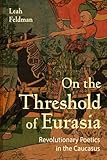On the Threshold of Eurasia : Revolutionary Poetics in the Caucasus / Leah Feldman.
Material type: TextPublisher: Ithaca, NY : Cornell University Press, [2018]Copyright date: ©2018Description: 1 online resource (282 p.) : 3 b&w halftonesContent type:
TextPublisher: Ithaca, NY : Cornell University Press, [2018]Copyright date: ©2018Description: 1 online resource (282 p.) : 3 b&w halftonesContent type: - 9781501726514
- Azerbaijani literature -- 20th century -- History and criticism
- Caucasian literature -- 20th century -- History and criticism
- Insurgency in literature
- Poetics -- History -- 20th century
- Russian literature -- 20th century -- History and criticism
- History
- Literary Studies
- Soviet & East European History
- LITERARY CRITICISM / Russian & Former Soviet Union
- Eurasianism, global avant-garde, Turkic Poetry, Caucasus, influence of Soviet anti-imperial revolution on literature, Muslim communist consciousness, contemporary geopolitics, Azeri revolutionary poets, Soviet Orientalism
- 899.96 23
- PK9030 .F45 2018
- PK9030 .F45 2019
- online - DeGruyter
| Item type | Current library | Call number | URL | Status | Notes | Barcode | |
|---|---|---|---|---|---|---|---|
 eBook
eBook
|
Biblioteca "Angelicum" Pont. Univ. S.Tommaso d'Aquino Nuvola online | online - DeGruyter (Browse shelf(Opens below)) | Online access | Not for loan (Accesso limitato) | Accesso per gli utenti autorizzati / Access for authorized users | (dgr)9781501726514 |
Frontmatter -- Contents -- Acknowledgments -- Note on Transliteration -- Introduction: Heterodoxy and Heterology on the Threshold of Eurasia -- Part I. Heterodoxy and Imperial Returns -- 1. Parodic and Messianic Genealogies: Reading Gogol in Azeri in the Late Imperial Caucasus -- 2. Aesthetics of Empathy: The Azeri Subject in Translations of Pushkin -- Part II. Heterology and Utopian Futures -- 3. A Window onto the East: Baku’s Avant-garde Poetics and the Translatio Imperii -- 4. Broken Verse: The Materiality of the Symbol in New Turkic Poetics -- Postscript: Latinization and Refili’s “The Window” onto Soviet Azerbaijan -- Notes -- References -- Index
restricted access online access with authorization star
http://purl.org/coar/access_right/c_16ec
On the Threshold of Eurasia explores the idea of the Russian and Soviet "East" as a political, aesthetic, and scientific system of ideas that emerged through a series of intertextual encounters produced by Russians and Turkic Muslims on the imperial periphery amidst the revolutionary transition from 1905 to 1929. Identifying the role of Russian and Soviet Orientalism in shaping the formation of a specifically Eurasian imaginary, Leah Feldman examines connections between avant-garde literary works; Orientalist historical, geographic and linguistic texts; and political essays written by Russian and Azeri Turkic Muslim writers and thinkers.Tracing these engagements and interactions between Russia and the Caucasus, Feldman offers an alternative vision of empire, modernity, and anti-imperialism from the vantage point not of the metropole but from the cosmopolitan centers at the edges of the Russian and later Soviet empires. In this way, On the Threshold of Eurasia illustrates the pivotal impact that the Caucasus (and the Soviet periphery more broadly) had—through the founding of an avant-garde poetics animated by Russian and Arabo-Persian precursors, Islamic metaphysics, and Marxist-Leninist theories of language —on the monumental aesthetic and political shifts of the early twentieth century.
Mode of access: Internet via World Wide Web.
In English.
Description based on online resource; title from PDF title page (publisher's Web site, viewed 25. Jun 2024)


